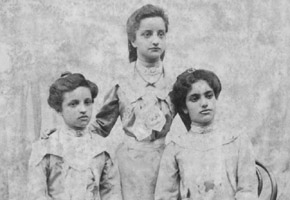

Study highlights the intense participation of elite rural Brazilian women in the diverse aspects of day-to-day life at the end of 19th and 20th centuries
Study highlights the intense participation of elite rural Brazilian women in the diverse aspects of day-to-day life at the end of the 19th and 20th centuries
Study highlights the intense participation of elite rural Brazilian women in the diverse aspects of day-to-day life at the end of the 19th and 20th centuries

Study highlights the intense participation of elite rural Brazilian women in the diverse aspects of day-to-day life at the end of 19th and 20th centuries
By José Tadeu Arantes
Agência FAPESP – The women of the Brazilian rural elite at the end of the 19th and the beginning of the 20th centuries may have played a much more active role inside and outside the home than is evident from the dominant ideological discourse of the day.
Beyond the superficial patriarchal order, these women were the centers of gravity for extensive families, business players and political opinion makers. This is the generalization that emerges from a unique and exemplary case studied by Marcos Profeta Ribeiro, professor at the Universidade do Estado da Bahia.
The study was conducted by a master’s student mentored by Maria Odila Leite da Silva Dias, a retired full professor at Universidade de São Paulo, where she continues to mentor master’s and doctoral students, and associate professor at Pontifícia Universidade Católica de São Paulo. The completed study resulted in the book Mulheres e Poder no Alto Sertão da Bahia (Women and power in Bahia’s Outback), published with FAPESP funding.
Ribeiro utilized the vast archives left by Celsina Teixeira Ladeia, sister of educator Anísio Teixeira, the mastermind behind Universidade de Brasília who notably defended educational reform in the country.
Ladeia (1887-1979) witnessed the last decade of the 19th century as a child and the first eight decades of the 20th century as an adolescent and adult. The book focuses on a specific period in Ladeia’s life, the quarter-century from 1901 to 1927.
“In this work, Ribeiro highlights the important contribution of gender relations studies in investigating the spaces of autonomy hidden by the roles attributed to women by the church, the culture and the traditions of elites,” comments Dias.
“The letters astutely studied by the author are expressive not only because of what they say but also, and mainly, because of the silence,” affirms the professor.
Ladeia was the daughter of Colonel Deocleciano Pires Teixeira (chief politician in the municipality of Caetité, Bahia State) and Ana Spínola Teixeira, the third of three daughters of Colonel Antonio de Souza Spínola (a farmer in Lençóis in Chapada Diamantina), whom Deocleciano later married.
The fruit of a marriage that was, above all, a political arrangement between two powerful families, Ladeia was her mother’s second daughter and the fifth of her father’s 14 offspring.
“Her intense epistolary activity, begun at age 14 in 1901, extended through the 1960s. This more than six decades of production resulted in a admirable archive of 1,500 letters written and received,” comments Ribeiro.
Ribeiro studied part of this legacy, letters produced through 1927, until she suffered a severe but brief bout of depression (described at the time as an infirmity caused by “nerve disorders”) due to stress from the prolonged illness and death of her husband (farmer and pharmacist José Antônio Gomes Ladeia, grandson of the Baron of Caetité) and the early signs of mental illness that affected her only son, Edvaldo Teixeira Ladeia (who died prematurely at age 35).
These letters depict a woman who was very active not only in managing her home, but also in managing farms, promoting philanthropy and articulating local politics.
“Celsina maintained rigorous accounting, made decisions regarding employees, planned investments to face the severe droughts that impacted the outback, was abreast of the changes in cattle prices and knew how to take advantage of the best offers of buyers and refuse the risky business propositions,” comments Dias.
Despite demonstrating the uniqueness that characterizes every human trajectory, Ladeia’s story was not the only one. The vast documentation studied by Ribeiro shows the intense participation of local elite women in the varied aspects of day-to-day life.
Ribeiro intends to broaden his focus in his doctoral research to study other women, including Ladeia’s mother, Ana Spínola Teixeira.
“The documents suggest a revision of the patriarchal issue. Through them, we realize that elite women exercised diffuse and peripheral power that is not apparent at first glance. And we found that the domestic environment was a space for the articulation of public power,” Ribeiro comments.
Republish
The Agency FAPESP licenses news via Creative Commons (CC-BY-NC-ND) so that they can be republished free of charge and in a simple way by other digital or printed vehicles. Agência FAPESP must be credited as the source of the content being republished and the name of the reporter (if any) must be attributed. Using the HMTL button below allows compliance with these rules, detailed in Digital Republishing Policy FAPESP.





